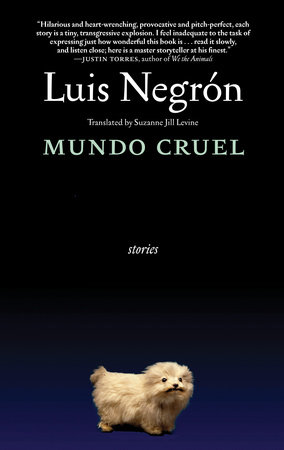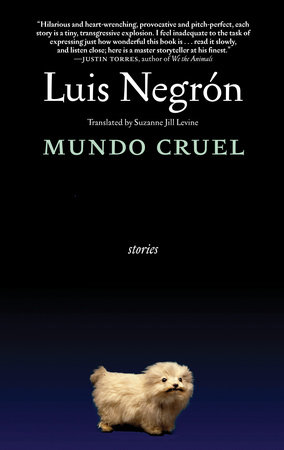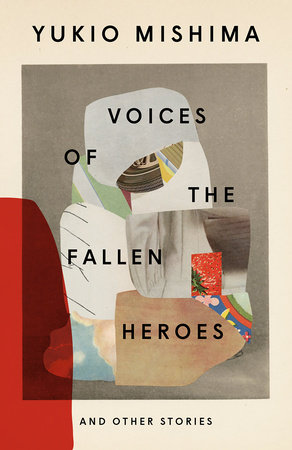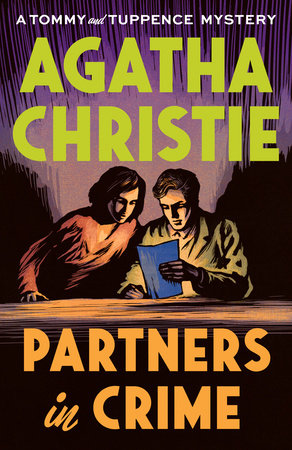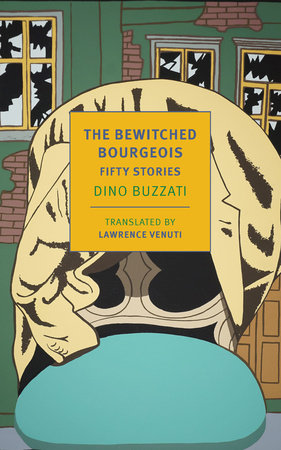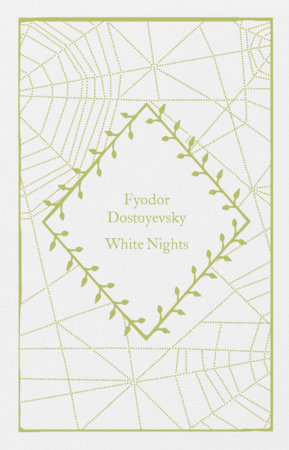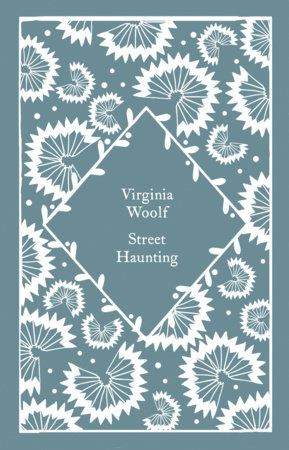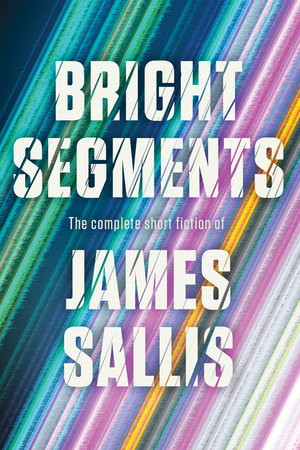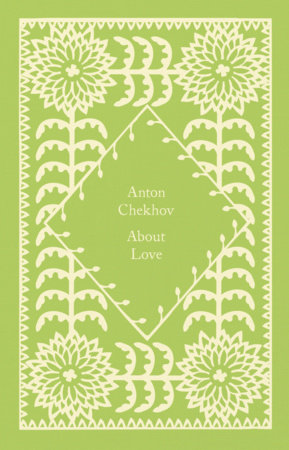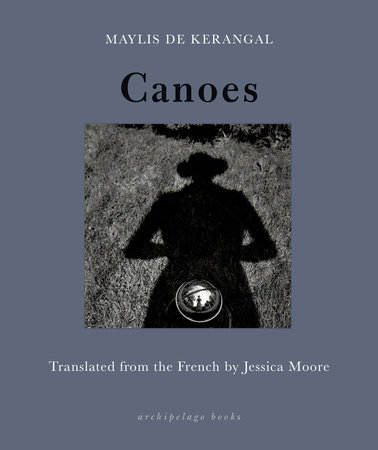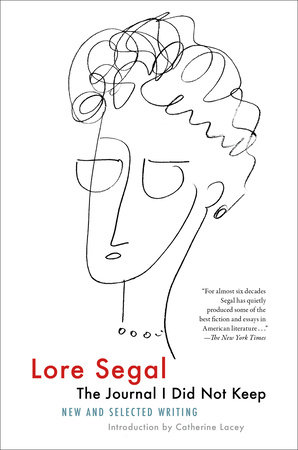Author Q&A
What was your road to writing?
I studied journalism because I wanted to learn how to write better. I never wanted to work in a newspaper though. Sometimes young students come to me and ask what should I study. Literature? Comparative studies? I tell them to just take one course at the journalism school, to see how they like it. Journalism teaches you how to be humble and honest. But of course they never follow my advice.
You’re a star now. What does that feel like? How is the tour going?
I am a bookseller; I work in a bookstore. I know how important it is for publishers to sell their books. I will do whatever I have to do to help them to sell books. And that’s why I’m here. As a writer, fame doesn’t help you. The page is always going to be blank. You’re going to have be with yourself. But, yes, the fame is also intimidating. People are looking for you to screw up with your next book.
Isn’t that scary?
I’m not scared. Again, I studied journalism so I have the confidence. What’s important is that this is the book I wrote. This is the book I presented. I am confident in it. Some people are going to like it and some people aren’t.
Can you talk about Mundo Cruel within the Latin American book market?
Publishing a Puerto Rican book almost never happens. It is very difficult to find a publisher who wants to publish a Puerto Rican author. Puerto Rican Literature isn’t even published in other Latin American counties because they don’t get us. They think we’re like Hawaii or something. Like they think we’re always on the ocean, barefoot drinking coconuts. Some of them think we speak English, but we don’t. Spanish is our language. Our literature is in Spanish. Our schools are in Spanish. For some reason,. Mundo Cruel is very popular in Costa Rica and Guatemala. And now they’re going to publish it in Cuba too! I just came back from there actually.
What about the other countries you’ve been to? What’s Cuba like?
Cuba is a beautiful place. Very safe. You can walk anywhere you want. People are really sweet and nice. And they’re not very political. Just like here. People here don’t talk about politics all day. People are people. They talk about love, they talk about life. The story that they tell you in Cuba is not about when Fidel came. They’re just doing what everybody does: trying to survive. Mexico is a great country. As great as the US. It has a huge personality. I went to the book fair there and it was amazing. The amount of people who go to that book fair is crazy. The same thing happened in Guatemala. The room was full of people. When I walked in I thought, Do they know what the book is about? I don’t want to read these stories. Can I even say that I’m gay? But they knew who I was. They knew what the book was about. They just loved books. Some people showed up with a piece of paper for me to sign because they couldn’t afford the book. I wanted to buy the book for them! But I’m poor too.
You share more than a translator with Manuel Puig. There’s a united sense of melodrama, of pop culture adoration, of the Telenovela.
People watch Telenovela to see happiness come true. I don’t know how much Telenovela you’ve watched, but there’s always something bad happening to the main character, like Oedipus with the gods in Olympus. Something is always happening that needs to get resolved. The promise of happiness is what keeps you watching for nine months, Monday through Friday. I once took a Telenovela class and the professor always reminded us that no matter how creative you are, there has to be a happy ending. And I like happy endings.
There’s not many stories nowadays with happy endings.
I think my stories have happy endings. For example, in “The Chosen One,” the main character is happy from the start. Nothing is going to destroy him.
That’s what’s so great about “The Chosen One.” Within the stereotype of the Catholic Church, especially with the idea of priests taking advantage of young boys, the main character subverts the role of victim. He enjoys himself. He has fun. He wants what would under religious and/or heterosexual ideology be pegged as immoral. He has all the power. He is not the victim.
None of my characters are victims. A friend of mine said that the world in my books is already gay. It’s taken for granted. That’s what I see and how I feel. We are who we are. But, in like, “Mundo Cruel,” people say that I’m showing a world where gay people don’t want liberation. I’m not saying that. Everyone except one character wants gay liberation. Everyone in that story is so happy the world finally accepted homosexuality.
Is there a pressure to represent queer culture to the full extent of the spectrum?
Yeah. I remember this guy who said my book was a little homophobic because my characters are “pathetic” and don’t represent how good we’re doing. I was like, I’m not an activist. I’m a writer. I believe in gay rights. But also, I’m not going to wait for someone to give me permission to be who I am. We’ve learned how to survive and be happy no matter what. That is the kind of gay people I grew up with. The types of gay people who would never go to a rally. They’d go to a Pride parade, sure. But they always felt that rallies were not for them, that they didn’t fit the stereotype of political activist. I mean, what’s wrong with sissies? Sissy is a beautiful way to be a human being. Llike in “The Vampire of Moca,” I love the fact that there’s this queen who’s falling in love with this twenty-something 7-11 employee and she takes him home and takes care of him and they have this platonic relationship and she’s happy, even though you know he’ll probably leave her for another woman. Happiness is not forever. Or, you have to reinvent happiness. We suffer and then we move on and it repeats. That’s the story I really like to tell.
What was the last story you wrote for the collection?
The last one I wrote was “Botella.”
Which is a sad story.
It is. But this is something I wanted to do. At that moment, people were saying really bad things about being macho. My brother is a macho. That’s how he was raised. He doesn’t know how to live a different way. I wanted to show that sometimes in life you’re trapped and there’s no way out for you. With that story, I wanted to show a heart in a macho. It breaks my own heart actually. Especially the ending.
Where he smells like shit.
No matter how much he washes, even in the ocean, he can’t get away from smelling like shit. Do you ever you recreate a setting when you’re writing?
Sure.
For some reason it was my house in “Botella.”
The house where the guy hangs himself is your house?
No, the house where the guy is murdered.
Oh, the second guy who dies.
Yes. I mean no. No, no. The first one.
I thought he hanged himself.
No, no, no, no. Someone else hanged him. That’s why the main character is trying to hide. He knows it’s not enough to be innocent or guilty because society is going to make you guilty. That’s why he’s trying to cover up everything.
I love when he tries to wipe away his fingerprints from the dead man’s hair before he realizes how stupid that thought is. It’s such a smart detail.
That story was really hard. I wrote it all in the first draft. Almost.
That blows my mind because “Botella” is full of metaphorical continuity. I mean, a simple example is how both the main character and Caneca, the dead man, have these irremovable smells, one a feces smell, the other a rum smell. Or how quickly the action escalates without being unnatural. It reminded me a lot of Hubert Selby, Jr.
I wanted to show how humanity is in everyone. Even in that person who in the gay community is a monster. Even there, there is a human being.
Which translates well to “The Garden.” If you were Carver, or a Carver MFA knock-off, “The Garden” would have finished two paragraphs early with a nice vague allusion to death via The Sound of Music ending on the TV. But instead, and what I loved, was that you kept going all the way to Willie’s funeral.
I put it there because I wanted the melodrama. The narrator is melodramatic. Willie is a gay guy who went to Columbia and lived in New York, living through the sexual revolution. He’s very secure about his sexuality. He knows about queer theory and all that stuff. And then there’s this kid who likes Willie because Willie represents that way of being gay. Nestito didn’t know it was possible before Willie. And Willie makes fun of him because Nestito likes Love Story. I like Love Story too! I love it! That and The Sound of Music.
So were you making fun of yourself too?
Yes, but also, I wanted to put these two ways of being gay together within this isolation. No one comes to the house. Because of Willie’s sickness. They’re the only ones there, and maybe that itself could be a very sad story. But they have their own world. Even Willie, his sickness, that’s why they call it “The Garden,” with all the fungus on his body. His way of life is different. When I think about that story, I see myself in all of the characters. I can be Sharon [Willie’s sister]. I can be very playful and naïve. But she’s also very smart and has a secret lover.
Are you a Pisces? [Sharon is a Pisces]
(Laughing) Yes.
(Laughing)And your rising sign is Pisces? [Sharon’s rising sign is also Pisces]
(More laughing) Yes. She’s a mess.
But she can deal with the messes.
Yes, yes. She’s there. She’s making sure that everyone is happy. I love the part where she makes up the story of the Chinese mafia kidnapping her. And that’s something from like a Barbra Streisand movie or something. One of the good ones. It’s a way of showing my love for that kind of movie. Not the perfect movie. I mean I like the perfect movies, but for me I like the other ones, like Love Story or Hello, Dolly! orYentl. For me, Yentl was the first gay movie of my life. I had no idea two men could love each other. I remember feeling very angry as a child because I would fall in love with my friends from school and then they would go for the girls. I felt like there was something wrong with me. Something really wrong. Or something missing. That I was always going to be left out from life.
Have you ever tried to write poetry?
No. I mean, I try. For lovers. But they don’t know anything about literature so I can get away with it.
The funny thing about Puig is that he never liked to talk about literature. What are your feelings on that conversation. Do you like talking books?
I do. But, at work I have to. Though even then I usually tell the story behind the story. Oh, this writer did this and this or had an affair with so and so.
There’s a way people talk about literature that almost sucks out all of the pleasure of reading.
Exactly. It becomes a ping-pong match. What do you know? I read for pleasure. I read Carver but I also read Allende, who I read when I was twenty-something.
I had the same affection for Stephen King. I can’t go into a college lit class and say, “I like Stephen King.”
Why not? You can find inspiration in anything. People ask me what are your major influences, and I say the radio. I love to listen to baseball games. It’s amazing the way they can narrate something you’re not seeing. You get nervous as a listener. You can picture the ball park. I love to listen.
I like when books have pop culture like radio. The characters obviously listen to songs in their cars, go to the movies on the weekends.
That’s why I like melodrama, which is pretty poppy. For me, melodrama is created to suffer, even if there is a happy ending. Melodrama is a way of faking pain. That’s something I really like. I’m a drama queen.
So you fake pain a lot? Or is it more like tapping into an emotion.
When I come home drunk from the bar, empty-handed I always play Audrey Hepburn singing “Moon River” in order to feel worse about myself. You have to embrace whatever you’re feeling. You have to be honest with your feelings. There’s nothing wrong with contradictions. We are human; we are made of contradictions.
But people want to change you. Being sad is scary for someone not sad. They want to make you feel better.
People don’t want to be sad anymore. But it’s part of human nature: You’re going to be sad. Someone dies and they don’t want you to cry. Of course you have to cry! You have to cry a lot. As much as you can because that’s what we do. I tell young writers they have to live. Writing is not all about books. It’s about being immersed in the world around you. Some writers can be away from the world. But I’m not that kind of writer. Someone told me once, you have to behave more like a writer.
What does that even mean?
(Shrugs) You know, I remember one day I met this very important gay writer. All my friends were impressed. What did you talk about, they asked. I said we talked about men. That was it. Not books. You go to a book fair and you see people talking about Borges and Faulkner and the other big names. That’s okay because that’s their thing. But there are others, writers who are wondering where’s the closest bar? You know Gabriel Garcia Marquez and Mario Vargas Llosa? Vargas Llosa is known as the intellectual writer. The correct writer. The perfect writer. He would talk about Tolstoy and Flaubert and what’s wrong with fiction. And then you have Garcia Marquez who liked to get drunk. If you tried to talk to him about literature, he’d change the subject. I studied journalism. You don’t talk about theory, at least not literary theory. Journalism is about paying attention and being honest. I got invited to a writing program to give a talk and all I’m thinking is the students probably know more about literature than me, you know. But I went anyway. I was there to talk about my book. Not about all the other ones.
That must have been refreshing for them, though. I’m sure some students get burned out or overloaded on all this theory. The scientific part of writing.
When you start talking about movies and melodramas and Telenovelas, some of them are like, Who is this? He’s not a writer. I write the way I can and the way I want. I don’t try to write in a way I can’t or don’t want. I don’t want to be the next Bolaño or Borges or Corteza. I want to be like Manuel Puig. I don’t want to imitate his writing, but who he was. Everyone tells me he was just concerned about his family, and would become embarrassed when people tried to talk to him about literature. But look at him. He was really great. You have to write for you. For your own happiness.
I heard that you’re working on two new books. Do you always have multiple projects?
Yes. I don’t know which one is going to come out first, but I’m not worried about that. When it’s ready it’s ready. I really believe you should take your time with books. I know publishers want you to have a book every year, and some people can do that. But that’s not me. I need to write and then let it rest.
Do you write every day?
Almost every day. Unless I’m out clubbing the night before.


